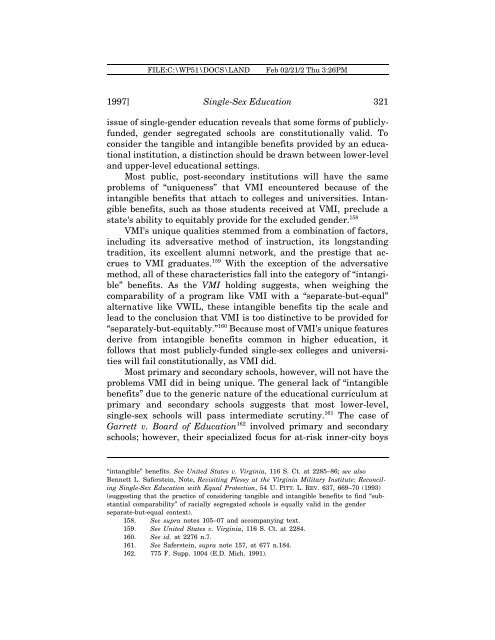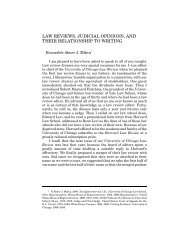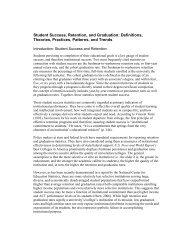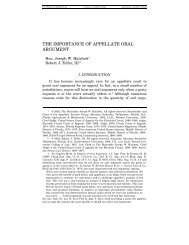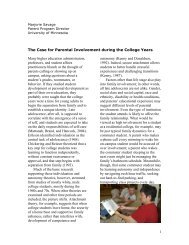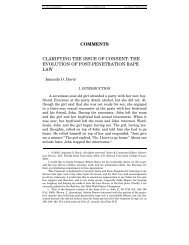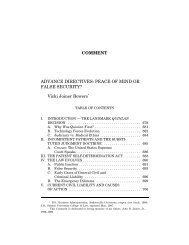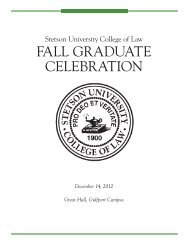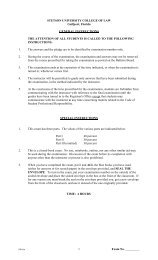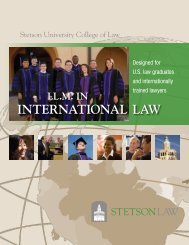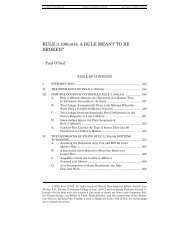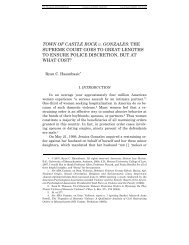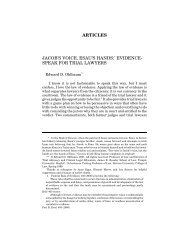The Future of Single-Sex Education After United ... - Stetson University
The Future of Single-Sex Education After United ... - Stetson University
The Future of Single-Sex Education After United ... - Stetson University
Create successful ePaper yourself
Turn your PDF publications into a flip-book with our unique Google optimized e-Paper software.
FILE:C:\WP51\DOCS\LANDFeb 02/21/2 Thu 3:26PM1997] <strong>Single</strong>-<strong>Sex</strong> <strong>Education</strong> 321issue <strong>of</strong> single-gender education reveals that some forms <strong>of</strong> publiclyfunded,gender segregated schools are constitutionally valid. Toconsider the tangible and intangible benefits provided by an educationalinstitution, a distinction should be drawn between lower-leveland upper-level educational settings.Most public, post-secondary institutions will have the sameproblems <strong>of</strong> “uniqueness” that VMI encountered because <strong>of</strong> theintangible benefits that attach to colleges and universities. Intangiblebenefits, such as those students received at VMI, preclude astate's ability to equitably provide for the excluded gender. 158VMI's unique qualities stemmed from a combination <strong>of</strong> factors,including its adversative method <strong>of</strong> instruction, its longstandingtradition, its excellent alumni network, and the prestige that accruesto VMI graduates. 159 With the exception <strong>of</strong> the adversativemethod, all <strong>of</strong> these characteristics fall into the category <strong>of</strong> “intangible”benefits. As the VMI holding suggests, when weighing thecomparability <strong>of</strong> a program like VMI with a “separate-but-equal”alternative like VWIL, these intangible benefits tip the scale andlead to the conclusion that VMI is too distinctive to be provided for“separately-but-equitably.” 160 Because most <strong>of</strong> VMI's unique featuresderive from intangible benefits common in higher education, itfollows that most publicly-funded single-sex colleges and universitieswill fail constitutionally, as VMI did.Most primary and secondary schools, however, will not have theproblems VMI did in being unique. <strong>The</strong> general lack <strong>of</strong> “intangiblebenefits” due to the generic nature <strong>of</strong> the educational curriculum atprimary and secondary schools suggests that most lower-level,single-sex schools will pass intermediate scrutiny. 161 <strong>The</strong> case <strong>of</strong>Garrett v. Board <strong>of</strong> <strong>Education</strong> 162 involved primary and secondaryschools; however, their specialized focus for at-risk inner-city boys“intangible” benefits. See <strong>United</strong> States v. Virginia, 116 S. Ct. at 2285–86; see alsoBennett L. Saferstein, Note, Revisiting Plessy at the Virginia Military Institute: Reconciling<strong>Single</strong>-<strong>Sex</strong> <strong>Education</strong> with Equal Protection, 54 U. PITT. L. REV. 637, 669–70 (1993)(suggesting that the practice <strong>of</strong> considering tangible and intangible benefits to find “substantialcomparability” <strong>of</strong> racially segregated schools is equally valid in the genderseparate-but-equal context).158. See supra notes 105–07 and accompanying text.159. See <strong>United</strong> States v. Virginia, 116 S. Ct. at 2284.160. See id. at 2276 n.7.161. See Saferstein, supra note 157, at 677 n.184.162. 775 F. Supp. 1004 (E.D. Mich. 1991).


